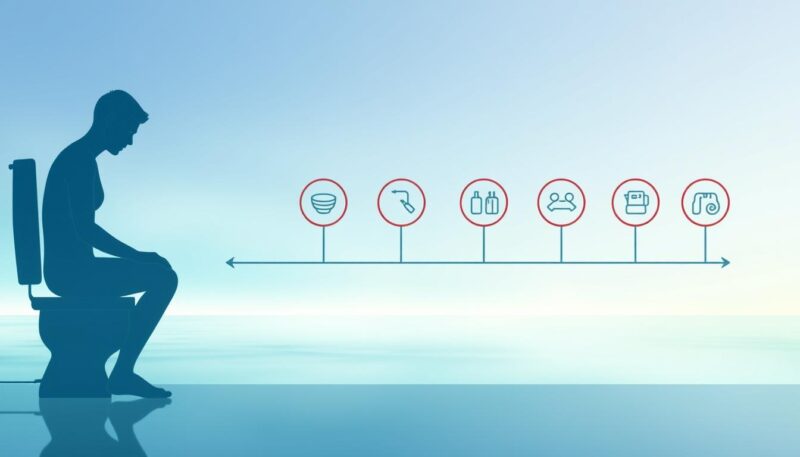Constipation affects over 4 million people in the U.S. each year. Magnesium citrate helps by softening stools and encouraging bowel movements. It works fast, usually within 30 minutes to 6 hours.
It’s easy to find in stores and is great for quick relief or before medical tests. A 2023 study showed it’s as good as MiraLAX for cleaning the colon before CT scans.
To use it right, mix the oral solution with 10 ounces of liquid. Then, drink another 8-ounce glass of water. But, using it for too long can cause diarrhea or stomach pain. If you don’t have a bowel movement in six hours or see blood in your stool, see a doctor.
Key Takeaways
- Magnesium citrate timing typically triggers bowel movements within 30 minutes to 6 hours.
- It’s an OTC option for occasional constipation, not recommended for chronic use.
- Laxative effects include increased intestinal water content to ease stool passage.
- Follow dosage guidelines: 6.5–10 oz daily for ages 12+, 7 oz for ages 6–11.
- Severe side effects like blood in stool require immediate medical attention.
Understanding Magnesium Citrate as a Laxative
Magnesium citrate is a saline laxative that helps with constipation. It combines magnesium and citric acid to make bowel movements easier. You can find it as a liquid or powder, often called Citroma®.
What Is Magnesium Citrate?
It’s a magnesium salt that works as both an osmotic and saline laxative. This means it pulls water into your intestines and softens your stool. You can take it as a liquid or mix it with water from packets. The FDA says it’s safe for short-term use only.
How Magnesium Citrate Works in the Digestive System
It works by pulling water into your colon, making your stool bulkier. This helps your intestines move things along. But, taking too much can upset your body’s balance of electrolytes, causing dehydration or diarrhea. It’s important to drink plenty of water while using this medication.
Common Uses and Recommendations
People use magnesium citrate to get ready for colonoscopies and to relieve occasional constipation. The amount you should take depends on your age and the brand you use. For example:
- Adults: 240–1000 mg mixed with water.
- Children: Doses adjusted by weight, with pediatricians’ guidance.
| Condition | Laxative Type | Example |
|---|---|---|
| Occasional constipation | Osmotic/saline | Magnesium Citrate |
| Chronic constipation | Osmotic | Polyethylene glycol (Miralax) |
| Severe cases | Stimulant | Bisacodyl (Dulcolax) |
Before using magnesium citrate, talk to your doctor if you have kidney disease, heart issues, or problems with electrolytes. Follow the instructions carefully to avoid becoming dependent on it. Always eat foods high in fiber to keep your digestive system healthy in the long run.
How Long Will I Poop After Taking Magnesium Citrate?
The time it takes for magnesium citrate to work varies based on several factors. Most people see results within 30 minutes to 6 hours. Understanding how quickly it works is key to planning its effects. Here’s a look at its typical timeline for bowel movements.

Initial Onset of Action
Effects usually start within 30 minutes to 3 hours. Liquid forms work faster than tablets or powders. Drinking water with it helps absorption. Some may feel cramps or urgency within an hour.
- Liquid forms start working in 30–60 minutes
- Tablets may take 2–3 hours to activate
- Hydration increases magnesium absorption speed
Duration of Laxative Effects
The effects last 3–6 hours. Most have 2–3 bowel movements in this time. Early movements may be solid, then turn to liquid stools as magnesium pulls water into the intestines.
When to Expect Complete Clearance
Full effects usually fade in 6–10 hours. Though, some effects might last up to 24 hours. How fast you clear it depends on your metabolism, dosage, and how much you drink. If symptoms last more than 24 hours, see a doctor.
Timing tips:
- Take 1–3 hours before desired effect for colon prep purposes
- Allow 10–12 hours between last dose and scheduled procedures
- Track bowel movements using a timeline journal to identify personal response patterns
Everyone’s body is different. Factors like diet, hydration, and gut health play a role. Always follow the label for the best results.
Factors That Affect Your Response Time
Many things influence how well magnesium citrate works. These magnesium citrate effectiveness factors include your health, any medications you take, and how much water you drink. Knowing these can help you guess how long it will take to see results.
| Factor | Impact |
|---|---|
| Metabolism and Gut Health | Conditions like IBS or hypothyroidism may slow digestive transit time. |
| Dosage Form | Liquid absorbs faster than tablets, affecting response speed. |
| Hydration | Low water intake can reduce effectiveness, prolonging results. |
| Medications | Opioids or GLP-1 agonists may delay or weaken effects. |
| Age/Body Size | Body weight and metabolic changes in older adults alter response timelines. |
Everyone is different, so results can vary. Always stick to the recommended dosage and talk to a doctor if you’re on any medications or have health issues. Drinking enough water and timing your use correctly can help get the best results.
The Complete Timeline of Magnesium Citrate Effects
Knowing the magnesium citrate hour by hour effects is key. This guide outlines each stage. It helps users prepare for the digestive clearing process.
First Hour After Consumption
In the first 60 minutes, most people don’t feel much. The magnesium starts to work in the stomach. It might cause some gurgling or cramping.
The full effects kick in 30 minutes to 3 hours later. This depends on how much you take and how fast you digest it. Stay close to a bathroom during this time.
activity period>
Between hours 2 and 5, things get more active. Magnesium pulls water into your intestines. This makes your stool softer and your intestines move more.
You might go to the bathroom a lot, and your stools could be loose or watery. Make sure you’re close to a bathroom and drink plenty of water to avoid dehydration.
Tapering of Effects (Hours 6–10)
Between hours 6 and 10, you might feel less urgent but still have some issues. The magnesium is leaving your body, and your bowel movements slow down. But they can still happen unexpectedly.
It’s important to keep drinking water to balance out any changes in your body’s salts.
Return to Normal Bowel Function
Most people go back to normal within 24 hours after taking magnesium citrate. If you’re still having issues like loose stools or cramps after this, you should see a doctor. Keeping track of how you feel helps you use it safely and comfortably.
Preparing for Magnesium Citrate Administration
Using magnesium citrate well means planning ahead. This ensures it works safely and effectively. Here are some tips to help you:

Optimal Timing for Taking Magnesium Citrate
The right time to take magnesium citrate varies. For a colonoscopy, start with the first dose 24 hours before. You’ll need three 10-ounce bottles, with the second dose 2-4 hours after the first.
For constipation, take it when you have 3-6 hours to use the bathroom without interruption. Don’t take it within 2 hours of other medicines to avoid bad reactions.
Hydration Requirements
Drinking enough water is key when using laxatives. Aim for 8–10 glasses a day. After taking magnesium citrate, drink 2–3 glasses of clear liquids right away.
For colonoscopy prep, stick to clear liquids until 3 hours before you go. Don’t drink alcohol or caffeine during this time.
Magnesium Citrate Preparation Tips
Follow the instructions for mixing the solution. Mix the powder with 10 oz of cold water. Keep it at room temperature and use it within 36 hours.
Here’s a guide for colonoscopy prep:
| Step | Action | Timing |
|---|---|---|
| Medication | Take first dose | Evening before procedure |
| Liquids | Drink clear liquids only | 24 hours pre-procedure |
| Food | No solid foods | 24 hours before procedure |
| Hydration | Stop drinking 3 hours pre-arrival | Follow facility instructions |
If you have questions, call the GI Endoscopy office at 860-679-3238. Only stop blood thinners after a doctor says it’s okay. Keep emergency contact info handy for any bad side effects.
Potential Side Effects and Discomfort Management
Magnesium citrate side effects are usually mild and short-lived. Symptoms like cramping or loose stools show the body’s reaction to the laxative. For minor discomfort, drinking plenty of water and resting can help laxative discomfort relief.
- Common Symptoms: Mild cramping, bloating, or increased bowel movements.
- Severe Reactions: Blood in stool, persistent vomiting, or dizziness require immediate medical care.
- Electrolyte Balance: Excessive use may disrupt magnesium levels, necessitating professional guidance.
| Common Symptoms | Severe Symptoms |
|---|---|
| Mild abdominal pain | Blood in stool |
| Transient nausea | Confusion or fainting |
| Increased bowel movements | Severe dehydration signs (dark urine, dry mouth) |
- Stay hydrated with electrolyte solutions to counter diarrhea.
- Use over-the-counter anti-diarrheal aids if symptoms persist beyond 24 hours.
- Apply a heating pad to reduce cramping.
If severe symptoms occur, stop using it and see a healthcare provider. Always follow the dosage instructions to lower risks. Drinking plenty of water and taking it slowly can lessen bad reactions.
When to Contact a Healthcare Provider
Magnesium citrate risks are rare but serious. Knowing when to call a doctor after using laxatives is crucial. Look for these warning signs:
Warning Signs of Complications
- Blood in stool or severe abdominal pain
- Fever over 100.4°F or vomiting that prevents hydration
- No bowel movement within 6–8 hours after taking a full dose
These symptoms could mean serious issues like blockages or allergies. Stop using it and call your doctor right away.
Indications of Dehydration
Watch for dry mouth, dark urine, or feeling dizzy. These are signs of dehydration. Kids under 2 and seniors are at higher risk. Look for less urine, fast heartbeat, or confusion too.
Persistent or Severe Symptoms
If diarrhea or cramps last more than 24 hours, get help. Using magnesium citrate for over a week without relief might mean a bigger problem. Tell the FDA about bad side effects at 1-800-FDA-1088.
Conclusion: Navigating Your Magnesium Citrate Experience
How well magnesium citrate works for constipation depends on many things. This includes how much water you drink and your overall health. Most people start to feel relief within 30 minutes to six hours.
It’s important to follow the dosage instructions. Adults should not take more than 350 mg a day. Taking too much can lead to stomach problems or even poisoning.
Drinking enough water and eating enough fiber (20–35g daily) can make magnesium citrate work better. If you have kidney disease or are on certain medications, talk to your doctor first. If you still have trouble or don’t see any results, see a doctor to check for other health issues.
Even though magnesium citrate is easy to find, it’s not a long-term solution for constipation. Always check the labels and keep track of how your body reacts. Using it wisely is key to managing constipation safely and effectively.
FAQ
What is magnesium citrate used for?
Magnesium citrate is used as a laxative to help with constipation. It’s also used to get ready for colonoscopies. It works by pulling water into the intestines, making stools softer and helping them move.
How long does it take for magnesium citrate to work?
You might feel its effects in 30 minutes to 3 hours. On average, it starts working in 1-2 hours. Its effects last about 3-6 hours.
Can I take magnesium citrate daily?
No, magnesium citrate is not for daily use. It’s meant for occasional constipation relief or bowel prep. Taking it too often can cause imbalances or dependency. Always talk to a doctor about long-term constipation issues.
Are there any dietary restrictions when taking magnesium citrate?
Yes, avoid fatty or dairy foods before taking it. They can make it less effective. After, eat light, easy foods to avoid stomach upset.
What should I do if I experience side effects from magnesium citrate?
Side effects like cramping, nausea, or bloating are common. Try gentle massage and drink plenty of water. But, if you have severe pain, vomiting, or dehydration, get help right away.
How much water should I drink while using magnesium citrate?
Drink 8-10 glasses of water while using it. This helps it work better and prevents dehydration. Staying hydrated also reduces side effects.
Who should avoid using magnesium citrate?
People with kidney disease, intestinal blockages, or on certain meds should not use it. Always check with a doctor before starting.
What are the warning signs that indicate I need to seek medical attention while taking magnesium citrate?
Watch for severe pain, rectal bleeding, not having a bowel movement in 6-8 hours, or dehydration signs like too much thirst and dizziness. If you see these, see a doctor fast.

